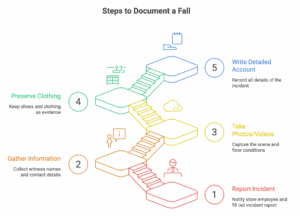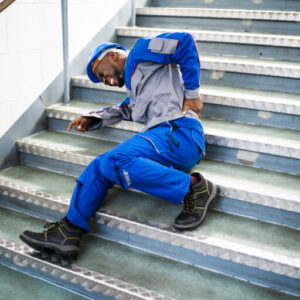That glossy shine on a department store floor might look appealing, but it can also mask a serious hazard. A freshly waxed floor, improperly maintained, can easily lead to a slip and fall, resulting in painful and potentially debilitating injuries. If you’ve experienced this, you’re likely wondering about your rights and whether the store is responsible.
Understanding Your Rights After a Fall on Waxed Floors
Department stores, like any business open to the public, have a legal duty of care to ensure the safety of their customers. This means maintaining their premises in a reasonably safe condition. While waxing floors is a common practice to enhance appearance and protect surfaces, it’s also a process that requires careful attention and adherence to safety protocols. Failure to do so can constitute negligence.
Think of it this way: a store owner wouldn’t leave a gaping hole in the floor uncovered. Similarly, they can’t create an unreasonably slippery surface without taking steps to warn customers and minimize the risk of falls. When they fail to uphold this duty, and you are injured as a result, you may have grounds for a personal injury claim.
Proving Negligence: How Department Stores Fail to Maintain Safe Waxed Floors
Several factors contribute to a department store’s negligence in slip-and-fall cases involving waxed floors. First, consider the type of wax used. Some waxes are inherently more slippery than others, especially when freshly applied. High-gloss acrylic waxes, for example, while visually appealing, can create an extremely slick surface. More modern polymer-based waxes offer better traction, but even these require proper application and maintenance.
Beyond the wax itself, application techniques are crucial. Too much wax, uneven application, or failure to properly buff the floor can all lead to dangerous conditions. Were there warning signs posted near the freshly waxed area? Many stores fail to adequately warn customers about recently waxed floors, relying on visual cues that may not be apparent to everyone, especially those with visual impairments or who are simply distracted by their shopping. In a 2022 study by the National Safety Council, falls were the leading cause of preventable injuries in public places, highlighting the importance of clear warnings.
Furthermore, maintenance is key. Spills need to be cleaned up immediately, and floors should be regularly inspected for excessive slipperiness. Even the best wax becomes a hazard if not properly maintained. Some stores will use mats in high-traffic areas after waxing, another key safety measure.
Consider the case of a woman who slipped and fractured her hip in a large department store. She successfully argued that the store failed to provide adequate warning and that the floor was excessively waxed, creating an unreasonably dangerous condition. Her medical bills and lost wages were covered by the store’s insurance. On the other hand, a case might be unsuccessful if the store can demonstrate they used appropriate wax, followed industry standards for application and maintenance, and posted clear warning signs.
Documenting Your Injury: Building a Strong Personal Injury Case
If you fall on a waxed floor in a department store, documenting the incident is crucial. Here’s what you should do immediately:
- Report the incident: Notify a store employee or manager immediately. Insist on filling out an incident report. Get a copy for your records.
- Gather information: Obtain the names and contact information of any witnesses to the fall.
- Take photos or videos: If possible, photograph the area where you fell, including the condition of the floor (e.g., excessive wax, lack of warning signs). A quick video walkthrough can also be extremely helpful.
- Preserve your clothing: Keep the shoes and clothing you were wearing at the time of the fall. They may contain evidence of the floor’s condition.
- Write down everything you remember: As soon as possible after the incident, write down a detailed account of what happened, including the date, time, location, and any details about the floor’s condition and warning signs (or lack thereof).

Seeking Medical Attention and Calculating Damages
Even if you don’t feel immediate pain, seek medical attention after a fall. Some injuries, like whiplash or concussions, may not be immediately apparent. A doctor can properly diagnose your injuries and provide necessary treatment. Furthermore, medical records are essential for documenting the extent of your injuries and building your claim.
“Damages” in a personal injury case refer to the compensation you may be entitled to receive. This can include:
- Medical expenses: Past and future medical bills related to your injury.
- Lost wages: Compensation for time missed from work due to your injury.
- Pain and suffering: Compensation for the physical pain and emotional distress caused by your injury.
- Property damage: If any of your personal belongings were damaged in the fall.
Holding Department Stores Accountable: Legal Options and Compensation
After a fall, the store’s insurance company will likely investigate the incident. It’s generally best to speak with an attorney before giving a statement to the insurance adjuster. Insurance companies often try to minimize payouts, and an attorney can protect your rights and negotiate a fair settlement on your behalf.
If a settlement cannot be reached, you may need to file a lawsuit to pursue compensation. An experienced personal injury attorney can guide you through the legal process, gather evidence, and represent you in court. The goal is to hold the department store accountable for their negligence and recover the compensation you deserve.
Preventing Future Falls: Department Store Responsibilities and Public Safety
Ultimately, preventing falls is about responsible floor maintenance and a commitment to customer safety. Department stores should:
- Use slip-resistant waxes and follow manufacturer’s instructions for application.
- Implement a regular floor maintenance program, including inspections and timely clean-up of spills.
- Post clear and conspicuous warning signs when floors are freshly waxed or potentially slippery.
- Train employees on proper floor maintenance procedures and hazard identification.
By taking these steps, department stores can create a safer shopping environment for everyone and avoid the devastating consequences of slip-and-fall injuries.






